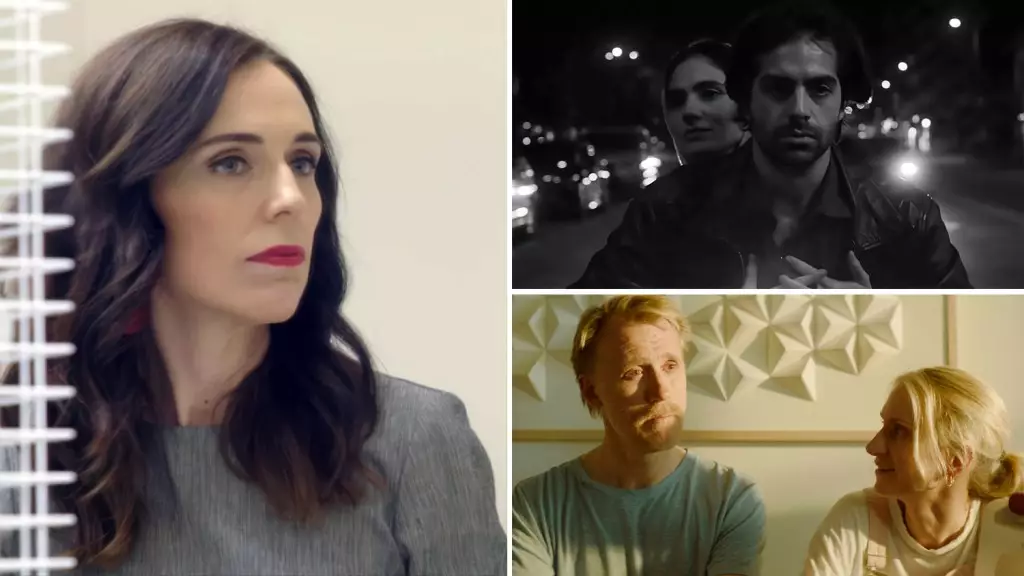In an age where entertainment is often dominated by mainstream blockbusters and CGI-laden spectacles, it’s refreshing to see a resurgence of intimate and nuanced storytelling in documentaries and independent films. As the Sundance documentary “Prime Minister” makes a thrilling debut at AMC Theaters, it shines a light on the power of personal narratives in a world filled with distraction. Directed by Michelle Walshe and Lindsay Utz, this film is more than just a candid portrait of former New Zealand Prime Minister Jacinda Ardern; it is a vital examination of leadership in a crisis. What stands out is how Ardern balances her personal journey of motherhood with the weighty responsibilities of governance.
Ardern’s ability to navigate complex societal issues—like the tragic Christchurch massacre that led to reforming weapon laws and the navigating of pandemic responses—resonates with audiences well beyond New Zealand’s borders. Her experiences raise profound questions: What sacrifices do leaders make, and how can they remain human in positions of immense power? The film’s exploration of Ardern’s dual identity as both a public figure and new mother sparks a conversation about gender and power dynamics in leadership roles, making it a vital viewing for anyone invested in the future of governance and gender equality.
Iconic Performances Against Historical Backdrops
On another front, “The Unholy Trinity,” featuring luminaries like Samuel L. Jackson and Pierce Brosnan, serves as a vivid exploration of morality against the stark backdrop of 1870s Montana. With Westerns enjoying a renaissance through a modern lens, Richard Gray’s film taps into the classic trope of the troubled hero navigating through moral quandaries. Brosnan’s portrayal of Sheriff Gabriel Dove juxtaposes Jackson’s enigmatic character, St. Christopher, complicating the narrative by not just presenting a straightforward good versus evil scenario but showcasing the gray areas of morality that individuals often confront.
These films remind us that cinema, especially within the genre of Westerns, serves as a reflective surface for exploring societal values and ethical dilemmas. The craftsmanship involved in melding action with deeply rooted character explorations sets a new standard for writing and performance. It challenges not just the characters within the film, but also audiences to reflect on their own moral compasses in tumultuous times.
Innovation at the Indie Box Office
The independent film landscape is teeming with vitality, a fact underscored by Neon’s substantial expansion of Mike Flanagan’s adaptation of Stephen King’s “Life of Chuck.” From a modest 16 screens to a sprawling 1,075 in just a week, this exponential growth signals a sea change in public willingness to support thoughtful adaptations of literary works. Fans of King’s storytelling are rewarded with a cinematic experience keen on introspection rather than mere thrills. It positions itself as a fresh interpretation, allowing Flanagan to infuse nuances into King’s multi-layered narrative.
On the other hand, projects like the Norwegian “Oslo Trilogy” and Rithy Panh’s documentative storytelling in “Meeting with Pol Pot” underline the importance of challenging the status quo in cinematic narratives. By forging connections between disparate cultures and societal issues, these films force audiences to engage critically with the world around them. They remind us that cinema is not merely an art form—it is a conduit for enlightening conversations around love, identity, and resilience in the face of adversity.
Reframing Sports Cinema Through Personal Struggles
Emphasizing human endurance, the sports drama “Tatami,” co-directed by Guy Nattiv, portrays Iranian athletes standing against oppressive regimes. This film’s narrative dives deeply into the psyche of its characters, elucidating the sacrifices they make and the ultimatum faced when personal aspirations clash with national expectations. Leila’s harrowing decision—to either comply with the oppressive mandates of her government or pursue her Olympic dreams—evokes a poignant empathy and raises crucial debates on autonomy and choice.
This approach not only redefines the sports film genre but does so in a manner that is reflective of real-world issues faced by many today, effectively intertwining personal and political narratives that resonate on multiple levels. It stands as a bold reminder that storytelling in cinema should reflect the complexities of the human experience, even in the realms of sports.
Documentary Insights and Musical Journeys
As independent documentaries like “Simple Minds: Everything Is Possible” take their place among this compelling roster, they reveal the transformative power of music and its ability to resonate across generations. The recounting of Simple Minds’ rise from Glasgow’s working-class communities to global pop icons showcases not just their musical evolution but also the cultural and societal shifts of the times they lived through. This makes for compelling viewing, as audiences find familiar echoes of their own struggles and triumphs mirrored in the story of the band.
Amidst the cinematic vibrancy of these releases, from the probing examinations of societal issues to explorations of creativity and resilience, it is evident that the contemporary film landscape is undergoing a meaningful evolution. As filmmakers continue to challenge traditional narratives, audiences are not only ready but eager to engage with content that pushes boundaries and provokes thought—confirming once more that the power of cinema remains as potent as ever.
